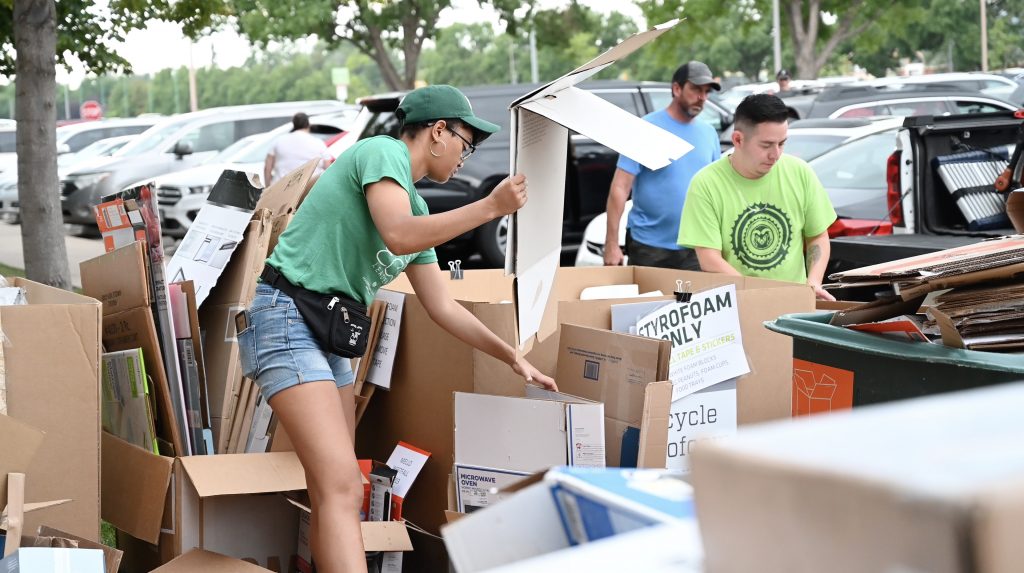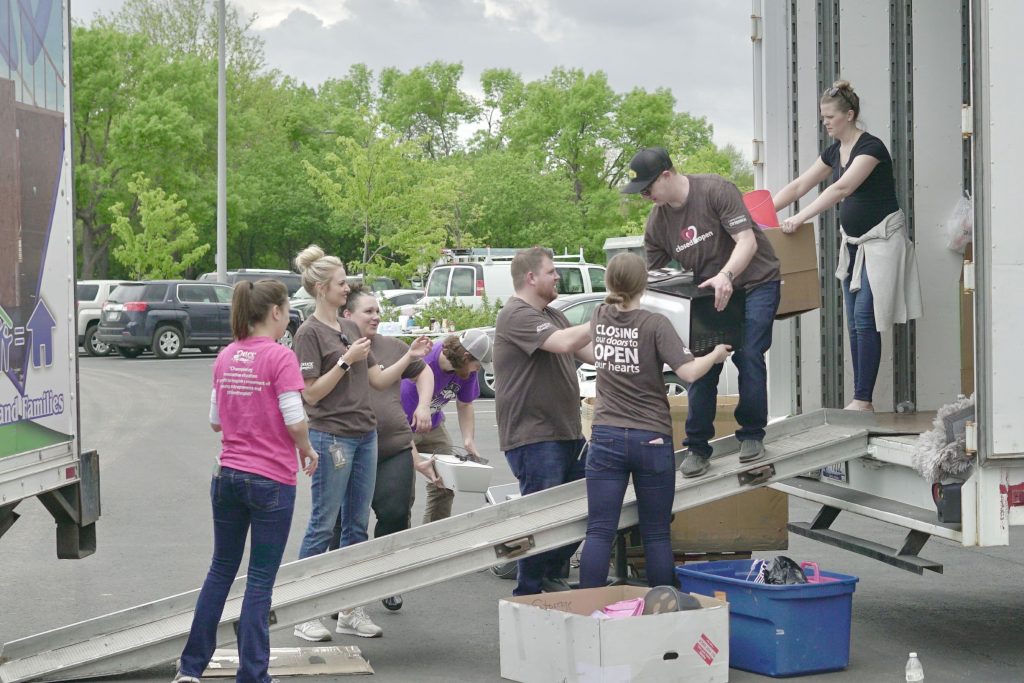Zero
Waste
Housing and Dining Services has been committed to reducing its waste impact on the environment for decades, through programs such as composting in all its facilities, recycling education to all residents, and donation stations during student move out. These initiatives illustrate the continued effort to divert the amount of waste sent to the landfill, both as a department, and as part of the university.
Composting
MEET OSCAR IN REAL LIFE! We can accommodate tours if you are in the Fort Collins area. Please email HDS_Sustainbaility@colostate.edu for inquiries.
What is Compost? Compost is organic material that has been decomposed to produce a soil product. Compost is comprised of three main ingredients: food waste, yard waste, and water. With time, these products break down to generate compost, which can be used as a fertilizer or soil conditioner in gardens and other landscaping.
At CSU, due to our composting facilities, we can compost all our food waste, as well as any products that are labelled compostable. These include to-go containers from our dining centers, napkins, and even animal bones and byproducts. When in doubt, please throw it out. For more information on specific compostable materials – visit our guide here.
As CSU, there are two composting facilities, one being a HDS living learning lab. In 2010, HDS invested in a state of the art, fully-automated composting system called the Earth Flow, or affectionately known as Oscar. This enclosed, 30-yard capacity compost bin is located on the CSU Foothills Campus (three miles west of main campus). Pre-consumer food waste from our dining centers is composted in Oscar. On average, Oscar diverts 300,000 pounds of food waste from the landfill each year. Post-consumer pulped food waste from the dining centers is composted at the Windrows, CSU’s second composting operation, managed by CSU Facilities Management.
All compost produced is used by the student farm, community non-profit organizations, and as soil amendments for new construction at CSU.
Dining Center Pulpers
- Ram’s Horn, Braiden, and Durrell Center Dining Centers have pulpers in their kitchens, which mix all the food and paper waste with water, and then grind up the material. This slurry is then taken by pipe to a centrifuge, which removes excess water and recycles it through the system. The pulped organic waste is emptied into collection containers and composted through the Windrow compost system.
- The pulpers have helped reduce the waste stream volume by 70 percent and water consumption by 80 percent in the dining centers.
Earth Flow Living Lab/ Oscar
- The Earth Flow in-vessel composting system, located on the CSU Foothills Campus, accepts 2,000 pounds of material per day. The system is affectionately called Oscar.
- The system operates as a living lab with student interns from Soil & Crop Sciences loading materials, taking measurements, and making recommendations for recipe and operational improvements. A faculty adviser in the College of Agriculture serves as a member of the Compost Team and selects the intern each semester. The Compost Operator provides hands-on instruction on site and the Assistant Director of Sustainability for Housing & Dining Services supervises the interns.
- Organic waste is loaded into one end of the vessel by placing the collection container on an automated tipper. Every time food waste is added, bulking material like straw, wood chips, and horse manure from the Equine Center is added at a 1:2 ratio.
- Material is composted for about three weeks inside the bin. Finished compost is discharged through an end door of the vessel. The compost is piled on site to cure for at least 3-4 weeks before being used in landscaping projects on campus.
Windrow Composting Partnership
- In 2017, Housing and Dining Services partnered with CSU facilities management to compost all pulped food waste from the Dining Centers in their windrow composting facility.
- This program composts HDS pulped food waste as well as food waste from the LSC, stadium, and academic departments. The HDS Earth Flow system runs side by side with the windrow facility. The funds to launch the windrow operation were provided by the University Facility Fee Advisory Board.
- Over 3 million pounds of food waste had been composted through the in-vessel composter and windrow system since their conception.
Zero Waste Sorting Guide
Housing and Dining Services Sustainability came up with a quick guide on how to recycle materials in the residence halls. To further help educate students, faculty, and staff on what can and cannot be recycled specifically at CSU, Housing & Dining Services developed the zero-waste sorting game. Visit here to participate: zerowastegame.colostate.edu.
2020 Waste Sorting Guide (PDF)
Waste Station Map (PDF)
Indoor Waste Sorting Bins (JPEG)
Recycle
- Plastic Tubs, Jugs, and Bottles ONLY (other plastic containers are not acceptable)
- Metals & Glass
- Cardboard & Paper (no neon)
- NO plastic bags, plastic cups, or clamshell containers.
- See the City of Fort Collins recycling guide for more information.
Compost
- Containers, coffee cups, and utensils labeled COMPOSTABLE
- Food scraps including coffee grounds, egg shells, dairy, meat and bones
- Paper plates, napkins and cups (not wax-lined)
- Tea bags (no staple) and brown paper bags (grease is OK).
Specialty Items
- Batteries, lightbulbs, ink cartridges: Deposit used these in the Techno Trash bins that are located in the lobbies of the apartments and residence halls and we will recycle them.
- Paint: Call Environmental Health Services at (970) 491-6746.
- Refrigerators, microwaves, electrical equipment (computers, monitors, TVs): Call CSU Surplus at (970) 491-1199.
- Styrofoam peanuts, pallets/wood, laser printer cartridges, fluorescent tubes: Call Facilities Management Integrated Solid Waste at (970) 491-0113.
Landfill
- Plastic bags, Styrofoam, wax-lined and plastic cups, cellophane, bubble wrap, straws, clamshell containers, and most individually wrapped food items such as individual coffee creamers and potato chip bags
Move-In
During Fall move-in, there are several “cardboard corrals” recycling stations set up across the residence halls to collect cardboard boxes and packaging for recycling. For the past several years, these recycling stations collect cardboard, styrofoam, and plastic thin film (the latter two materials are normally not collected throughout the academic year). These stations help divert almost 30 tons of cardboard from the waste stream every Fall. Collection stations are staffed by Eco Leaders, HDS Facilities staff, and volunteers.

Move-Out
In the Spring, Sustainability in HDS partners with different departments on campus, Homeward Alliance and Exodus Moving & Storing to promote the Pack it, Store it, Donate it Program. This program allows students to donate any unwanted goods from students that would otherwise end up in the landfill. This includes electronics, clothing, household goods, small appliances, and everything else under the sun. Each year the Pack it, Store it, Donate it Program diverts over 30,000 pounds of materials from the landfill. 100% of collected goods are then sorted and given away to over 45 local charities and non-profits in Colorado.
